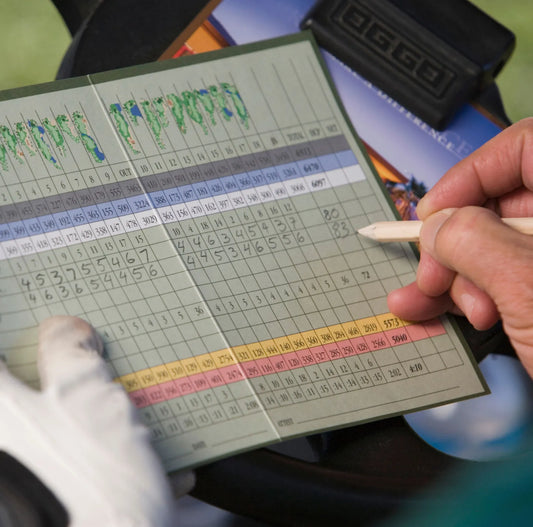When it comes to golf, handicap refers to a scoring system that allows players of different skill levels to compete against each other on more equal terms. In golf tournaments that use handicaps, the higher-handicap players start with a number of strokes subtracted from their total score for the round. This ensures that everyone has a chance to win, no matter how good they are at golf or how much they need to improve their game.
The Bottom Line:
- What does a handicap mean in golf? A handicap is a number directly correlated to how good of a golfer you are. The lower your score, the better you are on average.
- What factors affect your handicap? Your handicap is a reflection of your skill level, physical abilities, and the course difficulty.
- How do you use your golf handicap in scoring? To calculate your score, subtract your handicap from your total strokes.
- 5 tips for improving your golf handicap: Practice regularly on the course or with an indoor mat, study the game, improve your swing and equipment, keep up with your fitness, and play often.
Golf Handicaps: The Basics
According to the USGA, handicap "is a numerical measure of a player's potential playing ability based on the best 10 of their last 20 rounds." In simpler terms, your handicap number directly correlates to how good of a golfer you are—the lower the number, the better you are on average.
Every time you play a round of golf, you will have a score differential compared to par, which is your score minus the course par rating. For example, if you shoot an 85 on a course with a par of 72, your differential would be 13. These differentials help calculate your handicap index, which can then determine your handicap for each new course you play.
The USGA formula for calculating your handicap index is relatively complex, but many online tools can do it. Once you have your handicap index, you can look up the courses you plan to play and use that to calculate your handicap for that particular course.
What Factors Affect Your Handicap?
A golfer’s handicap index considers several factors to determine the player’s skill level. Here are some of the key points that influence your handicap:
Age and Skill Level
The USGA uses a gender-neutral system for calculating handicaps, but a player’s age and skill level can massively factor in. For example, older golfers with physical limitations may naturally have a higher handicap than an athletic golfer who needs fewer swings. In general, the better your score records, the lower your handicap will be.
Playing on Different Courses
The course’s difficulty rating has a significant impact on your handicap. The difficulty is broken down by the course rating and the slope rating, with more difficult courses typically resulting in higher scores for the average golfer. However, the handicap index formula considers these difficulty ratings to provide a more accurate calculation.
Recent Injuries or Swing Changes
Anytime you tweak your golf game, whether deliberately or accidentally, you’re bound to see a change in your scores. If you’re recovering from an injury, don’t put too much consideration on your handicap since your play is likely impacted. Similarly, if you make changes to your swing or try out a new strategy, adjust your handicap accordingly.
How Do You Calculate Your Handicap?
Several online tools and smartphone apps can help you calculate your handicap, but knowing how to do it the old-fashioned way is still helpful. Here’s a step-by-step guide on how to calculate yours:
Step 1: Set a baseline score
You need at least three 18-hole scores to calculate your handicap, but it’s helpful to have over 20 scores to calculate a more accurate handicap index. If you’re starting golf, make sure you play a few rounds before continuing.
Step 2: Determine the course and slope rating
Every golf course has a course and slope rating. The course rating is the expected score for a scratch golfer, while the slope rating refers to the difficulty of the course for a bogey golfer. Generally, you can find these ratings on the scorecard or by asking the golf course staff.
Step 3: Record your scores
Keep track of your scores for each round of golf you play. Ideally, you should play 18 holes, but you can still use a nine-hole score to calculate your handicap.
Step 4: Calculate your handicap differential
Plug in the correct numbers based on the course and your score:
Formula: (Adjusted Gross Score - Course Rating) x 113 / Slope Rating
- Adjusted Gross Score = gross score - course handicap
- Gross Score: total strokes taken
- Course Handicap: the number of strokes you are allowed to take based on your handicap index
Step 5: Choose your best rounds
Identify your lowest handicap differentials. If you entered more than 20 scores, only use your top 10 scores for the calculation.
Step 6: Calculate your handicap index
Take the average of your lowest handicap differentials (up to 10 scores) and multiply it by 0.96. Round to the nearest tenth; you now have your handicap index.
Why Handicaps Are Important for Recreational Golfers
Handicaps are an essential part of the game of golf for recreational players. Without handicaps, it would be difficult for players of different skill levels to compete against one another fairly.
In addition, handicaps provide a way for players to track their progress over time. By monitoring their handicap, players can see how their game is improving and set goals for themselves. Handicaps add an element of excitement to the game by giving players something to strive for. They provide a sense of accomplishment when a player lowers their handicap and motivate recreational golfers to keep practicing and keep playing.
How to Use Your Golf Handicap in Scoring
Handicaps range from 0 (for a scratch golfer) to 36 (for a beginner). For example, if you have a handicap of 0, you should be able to shoot even par on a course with a par of 72. To calculate your score, subtract your handicap from your total strokes.
Formula:
So, if you shot an 85 and you have a handicap of 18, your score would be 85-18=67.
If your handicap is over 18, you will subtract shots from the more difficult holes—represented by the hole's index score. For example, some scorecards list an index of 1 through 18, where 1 represents the most challenging hole, and 18 illustrates the easiest hole. So, if your handicap is 19, you would get two strokes deducted from the most challenging hole. If your handicap is 20, you will get two strokes deducted from the top two most difficult holes.
This type of scoring is necessary for "skins" style games, where golfers compete for cash based on who wins the hole.
5 Tips for Improving Your Handicap
There are several ways to better your handicap and simple exercises to improve your golf game.
1. Practice regularly
The more you practice, the better you'll become. Make time for at least one practice session per week to improve your handicap. You could also get personal training or join a virtual training site to enhance your form and strategy.
2. Study the game
Learn as much as you can about the different aspects of golf. The more you know, the better equipped you'll be. Besides technique, as your play increases, you’ll start to notice a wide range of strategies deployed on the golf course.
3. Improve your swing and equipment
You may start with borrowed or used clubs early in your golf career. As you progress, however, you will want to upgrade your equipment. Today's golf equipment and technology are light years ahead of what golf clubs and accessories used to be. Not only can clubs help you hit the ball farther, but they are designed to hit the ball straighter or with a specific shot shape. By improving your swing and visiting a club fitter, you can discover which clubs are right for you. A great example is exploring putters geared toward high handicappers.
4. Work on your fitness
At first glance, it may not seem that important to be fit for golf, but the truth is that better flexibility and a stronger core are vital to a good golf game. Not only does being fit increase your stamina, but it can also improve your focus, balance, and shot length.
5. Play often
In theory, the more you play, the better you'll get. If you're in a competitive league or want to improve, it's essential to play often. Different aspects of a golf game rely heavily on touch and feel that only develop over time. Sure, you may rear back and swing hard for some shots, but you'll need to know the distance and amount of power required for others. Putting and the short game are two essential parts of the game that high handicappers often forget about. When you practice, be sure to work on all aspects of your game, not just your iron or driver swings. For example, try incorporating indoor putting drills to improve your golf game.
Golf is a sport that takes time and effort to master, but the rewards are well worth it. Not only will you compete better and improve your handicap over time, but you will also get more enjoyment out of hitting the ball well and achieving a lower score. Having a high handicap for a while can benefit golfers who work hard because they can play better than their average and win more often.





